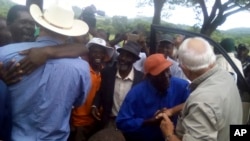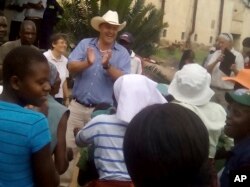One of the white Zimbabwean farmers who was thrown off his land by the government of recently ousted president Robert Mugabe has become the first white farmer to return to his property.
Robert Smart received a military escort Thursday to his Lesbury farm about 200 kilometers east of the capital, Harare. A soldier in a van watched the farmer's return and was there if Smart needed him. Smart did not need his services.
Smart and his family were greeted warmly with tears and ululations by the black farm workers who had lived and worked on the property for generations and who were also evicted from the property.
During the country's colonial times, whites grabbed large tracts of the country's best farmlands, leaving blacks to live in regions that were mostly not arable.
Mugabe said the farm evictions were meant to address colonial land ownership imbalances that did not favor the black majority, but instead favored whites who make up less than one percent of the population.
Land ownership in Zimbabwe has been fraught with emotional, racial and political issues for years.
White farmers were often evicted violently from their farms with security forces using tear gas and AK-47s under Mugabe's presidency.
The blacks who took over the farms, often Mugabe's cronies, usually did not maintain them, since they had no farming experience. Zimbabwe's economy suffered without its agricultural roots and the country's economy slid into hyperinflation.
Newly installed President Emmerson Mnangagwa has promised to undo some of Mugabe's land reforms in hopes of igniting the country's once-prosperous economy.
The Associated Press reports that earlier this month, Terrence Mukupe, the deputy finance minister, traveled to Zambia to talk with former white Zimbabwean farmers who have settled there about returning to their land.
Smart held back tears while greeting old friends and touring his ransacked house.
His son Darryn told Reuters, "We are overjoyed, over the moon. We thought we would never see this day coming." He said, "Getting back to the farm has given not just us, but the whole community hope that it's a new Zimbabwe, a new country."






